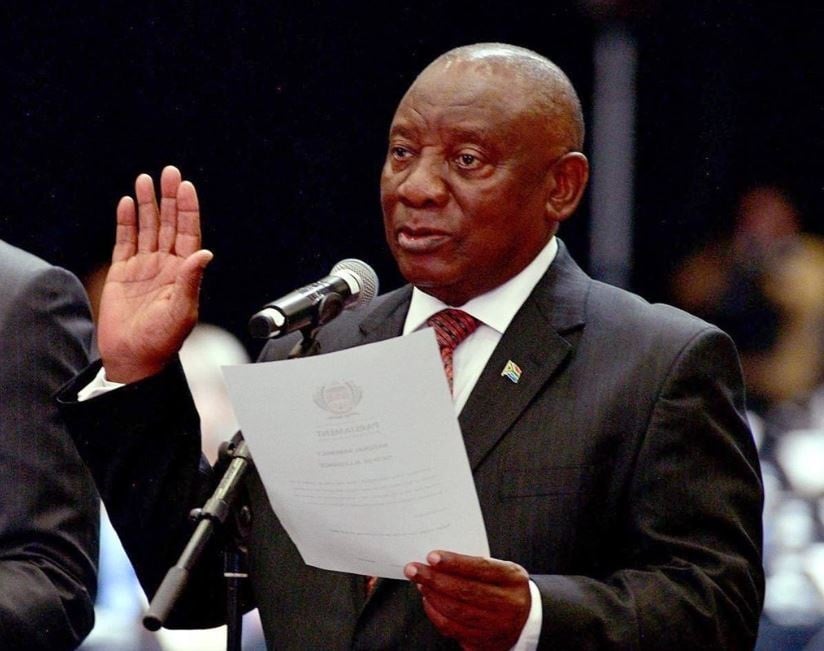President Cyril Ramaphosa was sworn in at the 7th sitting of Parliament in Cape Town. (Jaco Marais/Media24/Pool)
Despite fears that the number and diverse views of political parties in the GNU will make it unwieldy, the pragmatic and inclusive opening address of the seventh administration will boost consumer, business and investor confidence, says Busa’s Khulekani Mathe.
The fact that President Cyril Ramaphosa was able to deliver a coherent and comprehensive action plan for the next five years is the strongest indication yet that the Government of National Unity (GNU) will be able to keep South Africa on its slow, but steady, political and economic turnaround.
Despite concerns that the large number and diverse views of the political parties in the government will make it unwieldy, the pragmatic and inclusive opening address of the seventh administration will boost consumer, business, and investor confidence.
These are key preconditions for the acceleration of much-needed inclusive economic growth and job creation in South Africa. While many of the policies, projects, and objectives listed in the speech have been put on the agenda before, there now seems to be the necessary political unity – and will – to ensure their successful implementation.
The successful implementation of South Africa’s well-researched, evidence-based economic and social development policies is much more important than new initiatives.
Business is eager to actively build on its successful partnerships with the government – in energy, logistics, and crime-fighting – to achieve the strategic objectives that the unity government has set for the country. Business Unity South Africa (Busa) has consistently reiterated that inclusive and transformative growth is the only way to sustainably tackle South Africa’s social and economic crises, which include unemployment, poverty, inequality, and the high cost of living.
Beyond partnerships with the government, company profits are used to pay taxes to the government and dividends to the people of South Africa and other shareholders. Companies use their profits to make further investments, like contributing to public-private partnerships in social and economic infrastructure.
Business looks forward to the regulations that the government is putting in place to enable greater investment. It is the responsibility of a capable, ethical, and developmental state to create a facilitating environment for entrepreneurship, the development of small and medium enterprises, and the expansion of businesses.
As the president said:
When our economy grows, jobs are created.
Busa’s priorities for inclusive growth, in the president’s address, include:
• The second phase of Operation Vulindlela, which will focus on reforming the local government system and improving the delivery of basic services. As has been pointed out before, dysfunctional municipalities increase the cost of business operations, driving companies out of areas where jobs are needed or – in the worst cases – into bankruptcy. Systems to ensure that capable and qualified people are appointed to senior positions in municipalities are a vital first step in the right direction. Vulindlela’s past successes give confidence that the challenges in local government are now being decisively tackled.
• Sustainable poverty alleviation and social security measures are, in many ways, the foundation of the social stability on which all South Africans depend. However, education, entrepreneurship, job and wealth creation, are the most effective ways to sustainably lift generations out of poverty. The provision of title deeds for land and subsidised housing to provide people with assets, can do much to ensure financial inclusion and that economic growth is indeed inclusive.
• As the president pointed out: “While there is much contestation around the National Health Insurance (NHI), there is broad agreement that we must draw on the resources and capabilities of both the public and private sectors to meet the healthcare needs of all South Africans equally.” Busa will hold the president to his promise to “bring stakeholders together… to resolve differences.” We hope that this time, our voices will be heard.
• A sound operating environment provides many quick ways to increase the ease of doing business. The president’s commitment to fighting corruption, preventing undue political interference in the administration of the state, restoring the finances and operational performance of state-owned enterprises, and the responsible management of public finances will all do much to boost public and business confidence in South Africa.
However, we are painfully aware that a good speech alone is insufficient. We look forward to a report from the next Cabinet strategy session to consider the Medium-Term Development Plan, “which will set out clear goals and include specific, measurable objectives and a roadmap for achieving them. These goals will be properly aligned with the Budget, which will support the implementation of these objectives.”
Without this – and the important addition that the president must hold his ministers accountable for delivery without undue political considerations – the confidence the president has given the country will evaporate again.
Busa also eagerly awaits more details about the planned National Dialogue. Business has long believed that the contribution of all individuals in our country is necessary to move forward. Short-term and self-interested politics have often resulted in self-inflicted economic pain for South Africa.
There will no doubt be sharp differences in government in the months and years ahead, but the president’s commitments give confidence that they can be resolved with the best interests of the people of South Africa in mind.
Khulekani Mathe is the Chief Executive Officer designate of Business Unity South Africa.
News24 encourages freedom of speech and the expression of diverse views. The views of columnists published on News24 are therefore their own and do not necessarily represent the views of News24.
